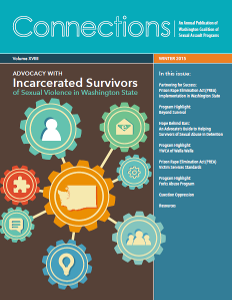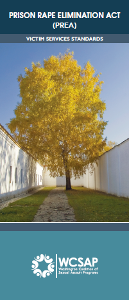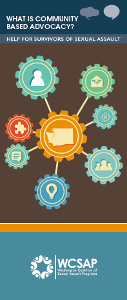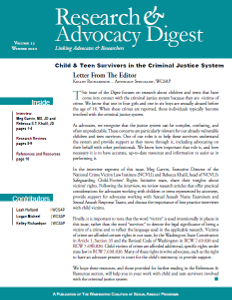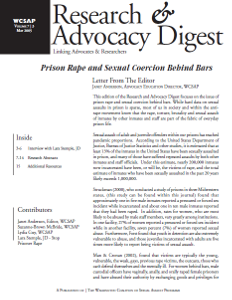- Prevention
- Working With Survivors
- Accreditation
- Advocacy Areas
- Culturally Specific
- Legal Resources
- Management
- Medical Resources
- SA Protection Order
- Subpoenas
- Support Groups
- Tech Safety
- Resources
- Policy
- Training
Incarcerated Survivors
- Preset filters:
- Topic: Incarcerated Survivor
- All filters are available on the Resources page.
For Incarcerated Persons & Corrections Staff
WCSAP Webpage
December, 2016
The intent of this presentation is to provide a starting place or a template for your program when responding to requests, typically from corrections agencies, for presentations for staff or incarcerated people about advocacy services. The concept of advocacy may be a new one for corrections staff and for incarcerated people. We have included the key points and best practice approaches to discussing the topic and expect you may customize some aspects of the slides to meet your community’s…
Topic
- Incarcerated Survivors
In Washington State
PDF & Printed Materials
December, 2015
In WCSAP's 2006 issue of Connections, Sexual Assault: Not Part of the Penalty, we explored the issue of sexual assault in correctional facilities. A lot has changed since then. Although the Prison Rape Elimination Act (PREA) was passed in 2003 to address sexual assault and abuse in prison, it was not until 2012 and 2014 that the final PREA standards that govern implementation of this law took effect.
One thing that has not changed since our last exploration of the issue of…
Topic
- Incarcerated Survivors
Working with Incarcerated Survivors and Correctional Facilities
WCSAP Webpage
August, 2015
Most detention facilities are required to comply with PREA. This includes state and federal…
Topic
- Incarcerated Survivors
-> TYPE MISSING, FIX ME <-
January, 2015
The Prison Rape Elimination Act (PREA) was signed into law in 2003 and in 2012, the Department of Justice standards that govern its implementation in most types of detention facilities were finalized.
The purpose of these standards is to tell facilities that are covered under PREA, what they need to do in order to be compliant. A number of these standards relate to a facility's responsibility to provide incarcerated survivors with access to sexual assault advocacy services. It was…
Topic
- Incarcerated Survivors
A Resource for Corrections Professionals
PDF & Printed Materials
January, 2015
This audience for this brochure is corrections professionals. The Prison Rape Elimination Act (PREA) requires correctional facilities to provide access to confidential community based sexual assault advocacy services for incarcerated people who have experienced sexual assault.
This means that correctional facilities will be reaching out to community based sexual assault programs for assistance in meeting this requirement. However, many corrections professionals are unfamiliar with…
Topic
- Incarcerated Survivors
PDF
February, 2012
This issue of the Digest focuses on research about children and teens that have come into contact with the criminal justice system because they are victims of crime. We know that one in four girls and one in six boys are sexually abused before the age of 18. When these crimes are reported, those individuals typically become involved with the criminal justice system.
As advocates, we recognize that the justice system can be complex, confusing, and often unpredictable. These concerns…
Topic
- Child Sexual Abuse
- Incarcerated Survivors
PDF
May, 2005
This edition of the "Research and Advocacy Digest" focuses on the issue of prison rape and sexual coercion behind bars. While hard data on sexual assaults in prison is sparse, most of us in society and within the anti-rape movement know that the rape, torture, brutality and sexual assault of inmates by other inmates and staff are part of the fabric of everyday prison life.
…
Topic
- Incarcerated Survivors
A Tool Kit to Help Advocates and Community
-> TYPE MISSING, FIX ME <-
Advocates and other social service providers who have been in the field for any length of time are all too familiar with the revolving door syndrome. That is, we witness the system-wide oppression of a small but growing percentage of people seeking our services who are revolving through the social service system over and over again, going from one agency to the next, sometimes for years. They experience multiple barriers, multiple forms of abuse (including provider prejudice) and are often…
Topic
- Incarcerated Survivors
- Trafficking & CSEC
- Anti-Oppression
WCSAP Webpage
Help for incarcerated victims in Washington State
Are you an inmate calling from a Washington prison, jail, or work release program or calling on behalf of an inmate?
This is the ONLY number inmates can call that won't be recorded and is guaranteed to be confidential: (855) 210-2087
In Washington State, there is a Sexual Assault Support and Information Line that is operated by an independent agency outside of the Department of Corrections.
…Topic
- Incarcerated Survivors
